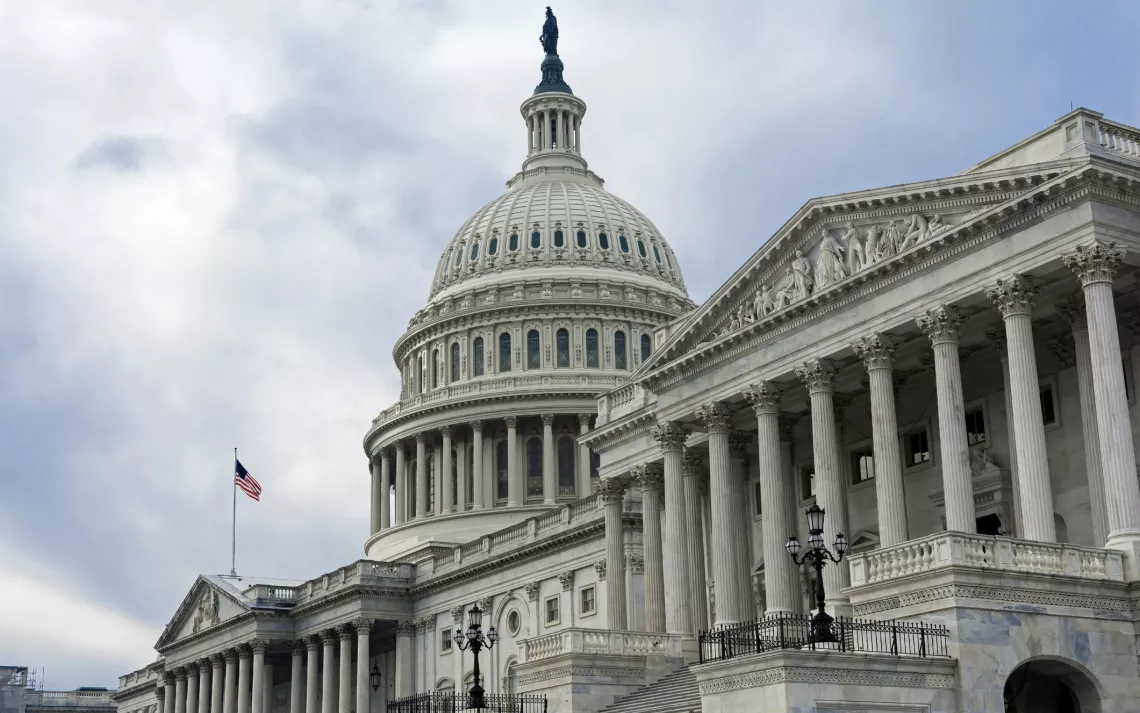Greening Capitol Hill
Sierra Club public-lands lobbying team supports grassroots activists

A stack of outfits hides behind Melinda Pierce's office door, including a conservative suit for attending fundraisers and a blouse, slacks, and Doc Martens shoes for spur-of-the-moment lobbying. Within five minutes of my arrival in the Sierra Club's crowded 40-person office in Washington, D.C., I'm working at Pierce's hectic pace, racing downstairs to fax a Sierra Club newspaper ad and back upstairs to field calls from legislators, stopping only for a quick meeting in the hall.
It's early October, just four days before the scheduled end of the congressional session, and Pierce and the other members of the public-lands lobbying team are in high gear, enlisting last-minute cosponsors for a bill to protect forests one minute and fighting to keep anti-environmental riders out of an appropriations bill the next. To an outsider, the number of campaigns seems daunting, the intricacies of congressional procedure almost impossible to understand. Yet Pierce and her colleagues seem to thrive on the chaos. After seven years as a Club lobbyist, Pierce still speaks of it as her dream job, and public-lands director Melanie Griffin expresses similar sentiments: "Doing this work, you feel like you're living your life the way you should be," she says.
Soon, I'm on my way to Capitol Hill to help with a "drop"--lobby lingo for passing out Sierra Club position papers--on the Interior appropriations bill. It gives me the creeps just to stand outside Senate Majority Leader Trent Lott's office door, but even the Club's most vocal opponents receive the material so they can be held accountable later for their anti-environmental votes. When distributed to friendly senators, the drops serve their primary purpose: "They're ammunition in a rhetoric war," explains Pierce. "We want to encourage our champions to go on the floor and represent the environmental position."
The timing of the drops is critical. Especially near the end of a session, a bill could pass out of committee in days-or minutes-and go to a vote. No matter what's going on in the office, someone has an eye on C-SPAN, monitoring the progress of the House and Senate. If a bill doesn't get voted on before Congress closes up shop, the lobbyists will have to start all over again the following year.
The effort can seem Sisyphean, but it's effective. When the Aspen Institute asked members of Congress and officials from the Clinton administration in 1997 to name "the national nonprofit organizations that you believe have the most influence on federal policy," the Sierra Club was mentioned far more often than any other environmental policy group. Most of the Club's big public-lands victories have been defensive since 1994, when conservative Republicans gained control of Congress.
"When the Republicans took over, we realized we had to fight to even have public lands," says Griffin, an 18-year Club lobbying veteran. The lobbyists' defensive skills should help them fend off the worst proposals from the new Congress. If they get a chance to advance green legislation, big wilderness bills in the Arctic, Utah, California, and the Northern Rockies, and ending logging on national forests top their list. "I started working here when Reagan was president," Griffin says. "So I've never really been let loose!"
Meanwhile, the lobbyists have been honing a secret weapon: "As awful as it has been having an anti-environmental Congress, it has really encouraged us to go back to our strengths in the grassroots," Griffin says. The Sierra Club has an army of people standing up at public meetings across the country, and writing letters to the editor of their local newspapers, saying the same things the lobbyists are saying in Washington. "When I go into a congressional office, they know that we have members who are constituents in their district," Pierce says. "Other lobbyists may have the cachet of money, but our cachet is people."
Part of the D.C. staff's job is to keep in touch with grassroots activists about strategy and to help them decide when to hold out for more, and when compromise may be necessary. Given the arcane rules and unlikely allegiances of Congress, anyone who insists on a "perfect" solution may not get any. This frequent communication often requires sacrificing evenings for late-night conference calls with local activists, but in some ways, it's the most important part of the day.
"Industry lobbyists are just doing a job. They run on negative stuff-ego, power trips, money, revenge. This is not just a job. We run on the inspiration of Yosemite, of the people we've met who need help with their local causes," Griffin says. "The grassroots makes us different. When I go to the Hill, I know I have people behind me, that I'm speaking for them and their special places."
 The Magazine of The Sierra Club
The Magazine of The Sierra Club



